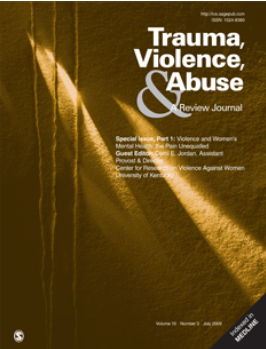Effectiveness of Brief Interventions for Sexual Assault Survivors: A Systematic Review and Meta-Analysis
IF 5.4
1区 社会学
Q1 CRIMINOLOGY & PENOLOGY
引用次数: 0
Abstract
Background: Sexual assault is a pervasive social issue worldwide, with significant harmful impacts on survivors’ mental health and well-being. Sexual assault services that provide specialist crisis and therapeutic programs are contending with long waiting lists. Brief interventions are emerging as a potential strategy to provide timely care, but it is important to know whether these approaches remain effective in improving patient outcomes. Aim: To synthesize evidence informing the effectiveness of brief interventions on person-centered outcomes for people who have experienced sexual assault. Methods: Four databases were systematically searched for trials testing the effectiveness of brief interventions (≤6 sessions) for sexual assault survivors. Studies were appraised, and data was extracted. Results from trials with homogenous data were combined in meta-analyses, and evidence certainty was assessed using GRADE. Remaining studies were synthesized descriptively. Results: Eighteen studies were included. Meta-analyses of randomized trials (n = 7) provide moderate certainty evidence that brief interventions improve symptoms of posttraumatic stress disorder (6 studies), depression (4 studies), and anxiety (2 studies). Results across other controlled and single-group pre-post studies further supported these findings. Discussion: Brief interventions can have a significant impact on reducing mental health symptoms for survivors who have experienced a sexual assault, providing support for the use of these models of care to broaden the reach and accessibility of sexual assault support services. There is limited evidence about other person-centered outcomes, such as quality of life measures, when considering brief interventions.性侵幸存者简短干预的有效性:系统回顾与元分析
背景:性侵犯是世界范围内普遍存在的社会问题,对幸存者的心理健康和福祉产生了重大的有害影响。提供专业危机和治疗方案的性侵犯服务机构正面临着漫长的等待名单。简短的干预措施正在成为提供及时护理的潜在策略,但重要的是要知道这些方法在改善患者预后方面是否仍然有效。目的:综合证据,为经历过性侵犯的人提供以人为本的简短干预的有效性。方法:系统检索4个数据库,以检验简短干预(≤6次)对性侵犯幸存者的有效性。对研究进行评价,并提取数据。具有同质数据的试验结果在荟萃分析中合并,并使用GRADE评估证据确定性。其余的研究进行了描述性的综合。结果:纳入18项研究。随机试验的荟萃分析(n = 7)提供了中等确定性的证据,表明短暂干预可改善创伤后应激障碍(6项研究)、抑郁(4项研究)和焦虑(2项研究)的症状。其他对照和单组前后研究的结果进一步支持了这些发现。讨论:简短的干预可以对减少性侵犯幸存者的心理健康症状产生重大影响,为使用这些护理模式提供支持,以扩大性侵犯支助服务的覆盖面和可及性。在考虑短期干预措施时,关于其他以人为中心的结果(如生活质量测量)的证据有限。
本文章由计算机程序翻译,如有差异,请以英文原文为准。
求助全文
约1分钟内获得全文
求助全文
来源期刊

Trauma Violence & Abuse
Multiple-
CiteScore
13.60
自引率
7.80%
发文量
131
期刊介绍:
Trauma, Violence, & Abuse is devoted to organizing, synthesizing, and expanding knowledge on all force of trauma, abuse, and violence. This peer-reviewed journal is practitioner oriented and will publish only reviews of research, conceptual or theoretical articles, and law review articles. Trauma, Violence, & Abuse is dedicated to professionals and advanced students in clinical training who work with any form of trauma, abuse, and violence. It is intended to compile knowledge that clearly affects practice, policy, and research.
 求助内容:
求助内容: 应助结果提醒方式:
应助结果提醒方式:


